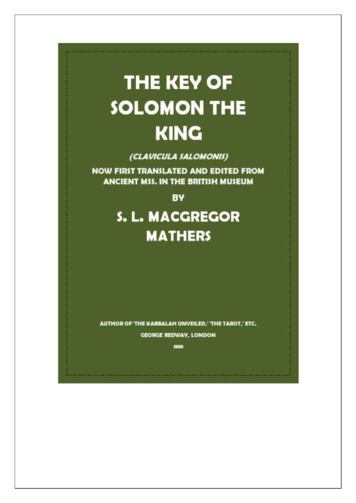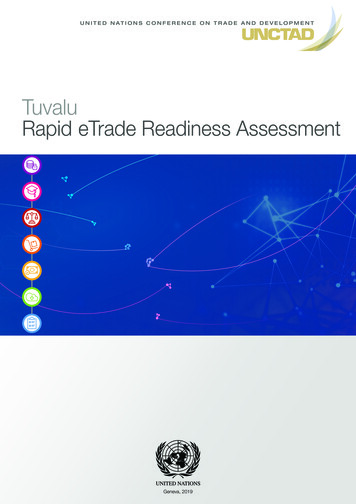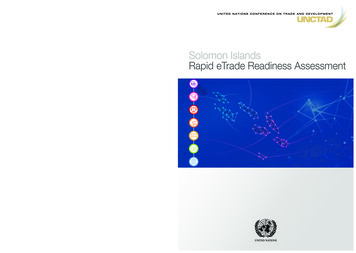
Transcription
U N I T E D N AT I O N S C O N F E R E N C E O N T R A D E A N D D E V E L O P M E N TSolomon IslandsRapid eTrade Readiness AssessmentPrinted at United Nations, Geneva – 1820898 (E) – July 2018 – 500 – UNCTAD/DTL/STICT/2018/6
U N I T E D N AT I O N S C O N F E R E N C E O N T R A D E A N D D E V E L O P M E N TSolomon IslandsRapid eTrade Readiness AssessmentNew York and Geneva, 2018
Solomon Islands Rapid eTrade Readiness Assessmentii 2018, United NationsThis work is available open access by complying with the Creative Commons licence created for intergovernmentalorganizations, available at http ://creativecommons.org/licenses/by/3.0/igo/.The findings, interpretations and conclusions expressed herein are those of the authors and do not necessarilyreflect the views of the United Nations, its officials or Member States.The designation employed and the presentation of material on any map in this work do not imply the expressionof any opinion whatsoever on the part of the United Nations concerning the legal status of any country, territory,city or area or of its authorities, or concerning the delimitation of its frontiers or boundaries.Photocopies and reproductions of excerpts are allowed with proper credits.This publication has been edited externally.United Nations publication issued by the United Nations Conference on Trade and Development.UNCTAD/DTL/STICT/2018/6
FINDINGS UNDER THE SEVEN eTRADE FOR ALL POLICY AREASiiiNOTEWithin the UNCTAD Division on Technology and Logistics, the ICT Policy Section carries out policy-orientedanalytical work on the development implications of information and communication technologies (ICTs) ande-commerce. It is responsible for the preparation of the Information Economy Report (IER) as well as thematicstudies on ICT for Development.The ICT Policy Section promotes international dialogue on issues related to ICTs for development and contributesto building developing countries’ capacities to measure the information economy and to design and implementrelevant policies and legal frameworks. It also monitors the global state of e-commerce legislation (unctad.org/cyberlawtracker). Since 2016, the section has coordinated a multi-stakeholders’ initiative entitled eTrade for all(etradeforall.org), which aims to improve the ability of developing countries, particularly least developed countries(LDCs), to use and benefit from e-commerce.Reference to companies and their activities should not be construed as an endorsement by UNCTAD of thosecompanies or their activities.The following symbols have been used in the tables :Two dots (.) indicate that data are not available or are not separately reported. Rows in tables have beenomitted in those cases where no data are available for any of the elements in the row ;A dash (-) indicates that the item is equal to zero or its value is negligible ;Reference to “dollars” (US ) means United States of America dollars, unless otherwise indicated ;Reference to “SBD” means Solomon Islands Dollars, unless otherwise indicated ; 1 SBD 0.126 US (June20, 2018).Details and percentages in tables do not necessarily add up to the totals because of rounding.
Solomon Islands Rapid eTrade Readiness AssessmentivPREFACEThe eTrade for all Initiative, launched at the fourteenth Ministerial Conference of UNCTAD in July 2016, is a practicalexample of how to harness the digital economy in support of the 2030 Agenda for Sustainable Development,notably Sustainable Development Goals (SDGs) 5, 8, 9, and 17. The initiative seeks to raise awareness, enhancesynergies, and increase the scale of existing and new efforts by the development community to strengthen theability of developing countries to engage in and benefit from e-commerce by addressing seven relevant policyareas : E-commerce readiness assessment and strategy formulation ICT infrastructure and services Trade logistics and trade facilitation Payment solutions Legal and regulatory frameworks E-commerce skills development Access to financingAs part of the initiative, demand-driven assessments are envisaged to provide a basic analysis of the currente-commerce situation in the countries concerned, and to identify opportunities and barriers. The resulting reportswill serve as a valuable input to these countries’ involvement in various discussions related to e-commerce anddigital trade, such as in the context of the UNCTAD Intergovernmental Group of Experts on E-commerce andthe Digital Economy.It may furthermore help LDCs to identify areas in which they could benefit from assistance by partners of eTradefor all.The Solomon Islands Rapid eTrade Readiness Assessment is the tenth such assessment conducted by UNCTADand the third for a Pacific Islands Nation. Requests for eT Ready have been received from Kiribati, Niue, Tongaand Tuvalu, which UNCTAD hopes to support in coming months. With this report, UNCTAD contributes to therecommendations of the joint WTO/UNCTAD/PIFS Workshop on e-Commerce for the Pacific to have all PIFmembers benefit from an eTrade Readiness Assessment as a first step towards developing a coherent regionalE-Commerce strategy. The Solomon Islands Rapid eTrade Readiness Assessment and action matrix contributeas well to the Pacific Aid-for-Trade strategy action plan.With the eTrade for all partners, UNCTAD is committed to continue supporting Solomon Islands and other PacificIslands Nations in its resolve to harness the potential of e-commerce for its development.Shamika N. SirimanneDirector, Division on Technology and Logistics, UNCTAD
FINDINGS UNDER THE SEVEN eTRADE FOR ALL POLICY AREASvACKNOWLEDGEMENTSThis Rapid eTrade Readiness Assessment for Solomon Islands was prepared by Rahul Bhatnagar in closecollaboration with a team comprising Cécile Barayre, Sven Callebaut, Dominic Leong and Marian Pletosu, underthe overall guidance of Torbjörn Fredriksson. Local inputs and support were provided by Ronney Kenitahana,UNCTAD national consultant.Profound gratitude goes out to George Tuti, Director, Department of External Trade, MFAET, Tanushree Sahai,Advisor, MFAET, and Ezekiel Parairae, Coordinator, National Implementation Unit (NIU) of the Enhanced IntegratedFramework (EIF) for championing the eT Ready in Solomon Islands.In Geneva, UNCTAD is grateful for the guidance of Mr. Barrett Salato, Minister Counsellor & Chargé d’affairesa.i. at Permanent Mission of Solomon Islands ; Ambassador Mere Falemaka, Permanent Representative, and Dr.Andrea Giacomelli, Trade Policy and Aid-for-Trade Advisor at The Permanent Delegation of the Pacific IslandsForum (PIF) to the World Trade Organization (WTO).The assessment benefited from inputs from more than 100 stakeholders in both public and private sectors,through the eTradeforall online surveys and subsequent interviews in Honiara.In Honiara, UNCTAD is grateful to : Alwyn Danitofea, Director – Communications and Timothy Mausae, DeputyDirector – Communications, Ministry of Communications and Aviation (MCA) ; Allan Arafoa CEO and AlfredGhemu, Deputy CEO of Solomon Islands Postal Corporation ; Wilson Leguvaka, Director – Regulatory Resources,Telecommunications Commission Solomon Islands (TCSI) ; Marlon Houkarawa, President, ITSSI ; Linda Folia,Manager – Financial Inclusion, Central Bank of Solomon Islands ; for their efforts in integrating e-commerce withinthe overall national development agenda, and lending robust support and guidance for this assessment.Comments and inputs provided by the following eTrade for all partner agencies’ experts have substantiallyimproved the final report : James Howe, Eric Buchot (ITC) ; Paul Donohoe, Alexandre Rodrigues, Youssouf Sy,Raquel Ferrari, Olivier Boussard (UPU) ; Luca Castellani (UNCITRAL) ; Mia Mikic, Yann Duval, Tengfei Wang, TsuenYip Jonathan Wong (UN/ESCAP).Funding for this report was provided by the Enhanced Integrated Framework (EIF), a core partner of the eTradefor all initiative. The guidance and support of Mbaye Ndiaye, EIF coordinator responsible for Solomon Islands ismuch appreciated.Desktop publishing was prepared by Léna Le Pommelet and the cover was designed by Magali Studer. Thedocument was externally edited by Nancy Biersteker.
viSolomon Islands Rapid eTrade Readiness FATPOTVETUNCDFUNCTADUNDPUPUUS WCOWIPOw3wAnti-Money Laundering / Combating the Financing of TerrorismAutomated System for Customs DataAutomated Teller MachineBetter Than Cash AllianceCash on DeliveryDigital Financial ServicesDiagnostic Trade Integration StudyDigital Services Financial GroupElectronic Funds Transfer at Point of SaleEnhanced Integrated FrameworkInformation and Communication TechnologiesICT Support UnitInformation Economy ReportInformation Technology Society Solomon IslandsInternational Telecommunication UnionMinistry of Communications and AviationMinistry of Commerce, Industry, Labor and ImmigrationMinistry of Education & Human Resources DevelopmentMinistry of Foreign Affairs and External TradeMicro Finance InstitutionMinistry of Finance and TreasuryMinistry of Infrastructure DevelopmentMinistry of Justice and Legal AffairsMicro, Small and Medium EnterprisesNational Development StrategyNational Statistics OfficeNational Trade Development CouncilSolomon Islands Customs and Excise Division (SICED)Solomon Islands Ports AuthorityTelecommunications Commission Solomon IslandsTrade FacilitationTrade Facilitation AgreementTrade Promotion OrganizationTechnical and Vocational Education and TrainingUnited Nations Capital Development FundUnited Nations Conference on Trade and DevelopmentUnited Nations Development ProgrammeUniversal Postal UnionUS DollarWorld Customs OrganizationWorld Intellectual Property Organizationwhat3words
FINDINGS UNDER THE SEVEN eTRADE FOR ALL POLICY AREASviiTABLE OF CONTENTSNOTE. IIIPREFACE. IVACKNOWLEDGEMENTS. VABBREVIATIONS. VIEXECUTIVE SUMMARY.VIIIMETHODOLOGY. 2MAIN FINDINGS AND RECOMMENDATIONS. 3FINDINGS UNDER THE SEVEN ETRADEFORALL POLICY AREAS. 51. E-COMMERCE READINESS ASSESSMENT AND STRATEGY FORMULATION. 52. ICT INFRASTRUCTURE AND SERVICES. 93. TRADE LOGISTICS AND FACILITATION. 134. PAYMENT SYSTEMS. 175. LEGAL AND REGULATORY FRAMEWORK. 246. E-COMMERCE SKILLS DEVELOPMENT. 277. ACCESS TO FINANCING. 30CONCLUSION. 33THE WAY FORWARD : ACTION MATRIX. 34ANNEX I : SOLOMON ISLAND PROFILE ON ETRADEFORALL.ORG. 40ANNEX II : BIBLIOGRAPHY AND WEBSITES USED . 43
Solomon Islands Rapid eTrade Readiness AssessmentviiiEXECUTIVE SUMMARYThe Solomon Islands economy is undergoing atransformational shift, driven by growth in productivesectors, a robust public sector reform program, a stablefinancial system closely integrated with nearby developedeconomies, and concerted efforts aimed at enhancingnational education and health systems. The countryhas made remarkable progress in the past decadein improving the fundamental drivers of the economyalong three axes : improving financial inclusion, enablinga gradual diversification in productive sectors (such astourism, fisheries and agriculture) away from dependenceon logging and mining, and leveraging ICT as a driver forconnecting government to citizens.The business case for e-commerce led growth inSolomon IslandsE-commerce appeals to policymakers and the privatesector as a mechanism to galvanize private sector activityand markets at the domestic level, and spur trade ledgrowth. Several key factors contribute to the case fore-commerce as a development opportunity.First, the physical characteristics of the country - involvinga coastline stretching 1,000 miles containing 1,000islands of which more than 300 are inhabited - posesignificant challenges for connectivity, governance, socialdevelopment and commerce. In the past, the populationoutside Honiara and provincial capitals was largelydetached from development efforts. ICT-led growth ischanging this. Liberalization of the telecommunicationssector in 2009 has led to high mobile telephony penetrationand a revolution in terms of connecting people in remoteareas to the government, banking services and with eachother. Some 94 per cent of the population is now withinreach of a mobile signal, and mobile penetration ratesrose from 20 per cent in 2010 to 78 per cent in 2017.Solomon Islands has joined the Better Than Cash Alliance(BTCA) and committed to converting 80 per cent ofits payments to digital channels by 2020. A number ofe-government initiatives, including online tax filings andgovernment salary payments, are being planned/piloted.There is public and private sector support for increasingthe role of e-Government in order to speed up the variousregulatory and infrastructure related components of thee-commerce ecosystem, in addition to encouragingconsumer adoption of online transactions.Productive sectors especially tourism, agriculture andfisheries, which were relatively neglected in the past infavour of logging and mining, are now receiving significantdevelopment attention. The focus is on building thevalue chain, supporting the Micro, Small and MediumEnterprises (MSME) sector, and fostering marketdevelopment for associated products. E-commerce fitsin neatly within this development paradigm. As a Pacificisland economy, where goods-based trading incurs highcosts, market development for trade, trade facilitation andlogistics are critical factors for success. The concertedefforts by Ministry of Foreign Affair and External Trade(MFAET), Solomon Islands Postal Corporation and othersto develop these areas bode well for e-commerce.Figure 1 : Relative maturity of the following areas pertaining to e-commerce in Solomon Islands(49 public sector responses, 27 private sector responses ; x-axis represents perception of maturity :1 being the least mature and 10 the most mature)Availability of support service providers (website development etc.)Gender equalityIT skills among entrepreneurs or availability of skilled contractorsPayment methods for e-commerceLegal frameworkEffective trade logistics and cross-border facilitation measuresICT infrastructureUnderstanding of e-commercePublic sectorPrivate sectorSource : UNCTADCoordination among institutionsHigh level political support0123456789
FINDINGS UNDER THE SEVEN eTRADE FOR ALL POLICY AREAS1The impending arrival of the submarine cable on SolomonIslands shores in 2018 will significantly boost Internetspeeds, uptime and latency. This will have a ripple effecton website development in the country and on browsingactivity. Finally, there has been increasing growth andmaturity vis-à-vis e-commerce in almost all the policyareas, with the possible exception of skills development,where a significant skills mismatch persists and focus onthe tertiary ICT education has yet to emerge.tax payments, will drive consumer confidence in onlinetransactions, which in turn will create a spillover impact forfuture e-commerce transaction activity as well. Third, thenational payment systems bill is an essential componentthat will lay out the legal basis for electronic payments.This will allow enhancements such as automatic chequeclearing, online interbank transfers, and other paymentsystem innovations. It will drive inflow of fintech solutionsby commercial banks and non-bank financial actors.Current commercial activity online is limited to buyer-sellerinteractions, without actual order placement or payment.The base of e-commerce in Solomon Islands is low, andthere are no lead firms. However, buyer-seller interactiononline is growing especially through social media sites.There are a number of buy/sell Facebook groups with1,000 plus members including overseas diaspora) whouse the groups to advertise, meet, negotiate and sell awide range of products, including land and houses. Thekey advantage is fast turnaround. While the bulk of theproducts are second-hand goods, there is some retailactivity as well. Within the fisheries sector, a numberof companies are using Facebook as an advertisingmechanism for selling fresh catch on a weekly basis, atrend that has become popular and may be replicated inother sectors. The hotel sector is the main e-commerceoperator in the country. While leading hotels have websitesand offer booking capabilities, most activity takes placethrough third party websites, such as Booking.com.Important hurdles to overcomeThe next few years will see a spurt in online presencefor existing businesses in the tourism sector due todevelopment activity led by partners including EIF andStrongim Bisnis (DFAT). This will be followed closely byactivity in agro-industry sectors which are also recipientsof significant development support with a market sidecomponent. It is also anticipated that mobile phone-basedactivity rather than activity over fixed line connections willdominate e-commerce activity. This is due to the verylow level of fixed line penetration (0.18 per cent in 2017),as well as the anticipated rise of smartphone use in thecountry estimated by GSMA to rise to 54 per cent (ofoverall mobile subscribers) in 2020 from 24 per cent in2014.Growth in online transactions is likely to be led by thegovernment in the initial stages. First, the weak base of theprivate sector – only recently starting to diversify towardsproductive sectors – constrains emergence of leadfirms. Second, the significant number of e-governmentinitiatives that have been piloted recently, including onlineWhile there is national consensus (and consequent focusthrough development plans and strategies) on ICT as asupport driver, the focus on e-commerce and on ICT useby enterprises has only started emerging now and is stillin nascent stage of development.First, the conflict spanning 1999-2004 created deep andlasting economic and socioeconomic fissures in SolomonIslands. Successive governments have focused thepost-conflict period on resolving the challenges facedby 80 per cent of the population that live in remote ruralareas, through health, education, and financial inclusioninitiatives. Second, the aforementioned dependenceon the logging and mining sectors has led to otherproductive sectors being neglected and slow emergenceof a viable private sector base. Third, ICT penetration isa relatively new growth phenomenon and the consumerbase will require time to get used to conducting onlinetransactions. This is reflected in the fact that the bulk ofservices currently utilized are mobile banking services.With time and emergence of services with more complexICT use, the utilization of mobile money for paymentswill increase. Fourth, satellites are the sole means ofinternational Internet connectivity for the country currently.It is expensive and prone to disruption in the wet season,which is a major challenge given that Internet speeds (bothin terms of average and peak sessions) in Solomon Islandsfall well below regional averages. Indeed, the successfuldeployment of the submarine cable and implementationof last mile connectivity through backhaul networks will becritical for e-commerce growth in the country.The current low use of e-commerce belies significantpotential for the sector to grow swiftly and make economicand socioeconomic contributions to the country. Tradeis a lifeline for the economy and e-commerce shouldhelp spur trading relationships. Additionally, it will helpin developing national markets, bringing disparate andremotely located buyers-sellers closer together.
Solomon Islands Rapid eTrade Readiness Assessment2METHODOLOGYA four-step approach was used for the Rapid eTrade Readiness Assessment for Solomon Islands, to ensure ahigh level of participation and engagement of key stakeholders in the consultative process :Figure 2 : Assessment methodologyPHASE 1StakeholderengagementLiterature reviewPHASE 2SurveycustomizationDisseminationof surveyPHASE 3PHASE 4In-countrydata gatheringLocal validationof early findingsReportdraftingValidation Phase 1 Stakeholder engagement and literaturereview, 10 January - 30 February 2018. Phase 2 Questionnaire customization and dissemination, 1 March - 15 May 2018. Two customizedonline questionnaires were distributed to a widerange of public and private sector stakeholders.More than 110 survey responses were receivedthrough the survey exercise. eTrade ReadinessQuestionnaireSummary eTradeReadiness Report ActionMatrixAs with all other Rapid eTrade Readiness Assessments,the seven policy areas used in the eTrade for all initiativewere used as entry points for this assessment. Theseare :1. E-commerce readiness assessment andstrategy formulation2. ICT infrastructure and servicesPhase 3 Semi-structured in-country interviewsand local validation, 19 -23 March. 2018.3. Trade logistics and facilitationPhase 4 Report writing and finalization, 1 April 30 June 2018.5. Legal and regulatory framework4. Payment systems6. E-commerce skills development7. Access to financingThe information provided in this report is based ondata collected from survey respondents from boththe public and private sectors and stakeholders metin bilateral and roundtable-based discussion formatsduring the mission (16 - 20 April 2018).
FINDINGS UNDER THE SEVEN eTRADE FOR ALL POLICY AREASMAIN FINDINGS AND RECOMMENDATIONSMAIN FINDINGSMAIN RECOMMENDATIONSe-Commerce Readiness Assessment and Strategies FormulationOverall low national readiness level for e-commerce, butsignificant strides made recently - including adoption of nationalICT strategy, umbrella coordination group on digital finance andstrong integration of private sector in policymaking. Main focus ison developing ICT as a support driver, rather than developing ‘ICTas a business’. The government’s drive towards e-governmentis encouraging consumer adoption of online transactions andspeeding up regulations and infrastructure.Extend focus on developing ICT as a business sector. Ensurefuture plans/strategies with a market-side component includingan e-commerce dimension. Reduce uncertainty regarding MCA’smandate and supervisory scope and strengthen it throughfinancial/technical support. Strengthen ongoing public-privatedialogue on ICT development with an added focus on e-commerceand the digital economy. Facilitate continued progress one-government initiatives and harmonize activities. Develop ane-commerce strategy in the medium term.ICT Infrastructure and ServicesInternet penetration has increased rapidly in the past decadefollowing telecommunications sector liberalization withcompetent regulation, and the consumer base has expandedin lockstep. Solomon Island’s difficult geography makes mobilephones and their related services (telephony, Internet and mobilebanking/money) key drivers of financial and technologicalinclusion. Satellite Internet is slow, expensive and unreliable.Impending arrival of submarine cable with Australian assistanceexpected to boost speeds, uptime and reduce latency.Oversee the successful implementation of submarine cableproject and deploy a fair-play model involving service providers inimplementing last mile connectivity and providing diverse servicesthrough high-speed broadband. Encourage telecommunicationsservice providers to cooperate on network/infrastructure sharingin remote areas to benefit from cost sharing, as well as improvinglast mile connectivity. Continue discussions at national level ondeveloping a universal access framework that does not impartundue burden to the government or the service providers.Trade Logistics and Trade FacilitationSolomon Islands Postal Corporation has emerged as key driverof innovation and consensus building. Recurring challengesin paying membership dues to international partners includingUPU and WCO may restrict access to industry leading expertise.ASYCUDA has resulted in revenue gains for customs authority,and the anticipated deployment of further systems with UPUand WCO support is expected to improve processing times. Thelaunch of the what3words addressing system, and continuedprogress on a national Postal addressing system are promisingdevelopments. De minimis value of 2 SBD (US 0.25) createssignificant backlogs in customs processing times and adds timeburdens for both authorities and importers. A number of tradefacilitation measures are pending implementation.Advocate for demand-side adoption of recently piloted addressingsystem and maintain progress on adopting a national post codeaddressing systems among other initiatives. Revise the nationalde minimis regime. Develop sustainable models for ensuringcontinued membership in international organizations, such as theWCO. Focus on implementing planned trade facilitation initiativesincluding ‘E-Single Window, E-Application and Issuance ofimport and export permit, E-Payment of duties and E-Applicationfor Customs refunds’. Focus trade facilitation efforts on theimplementation of paperless trade and institutional cooperationmeasures. Ensure participation in new regional UN treaty oncross-border paperless trade facilitation.3
Solomon Islands Rapid eTrade Readiness Assessment4MAIN FINDINGSMAIN RECOMMENDATIONSPayment SolutionsAnticipated passage of the national payment systems billand government’s commitment under the Better Than CashAlliance (BTCA) to convert 80 per cent of its payments to digitalchannels by 2020 are promising developments. Mobile moneyhas experienced rapid growth aligned with mobile servicesacross the country, however consumers primarily utilize it formobile banking purposes and the case for using mobile moneyfor payments (e-wallets) has not been adequately leveraged.Financial illiteracy is a pervasive challenge, given that it affectsabsorptive capacity of the consumer base for any innovations,and additions in services. The government has recognized theneed to improve quality, network of cash agents. The countryhas been appreciated for its due diligence in managing AML/CFTrisks.Pass the national payments systems bill in parliament and holdconsultations with relevant stakeholders, including SolomonIslands Postal Corporation, to discuss implications. Improvefinancial literacy, and client identification, especially outside thecapital. Foster development of an independent mobile moneyagent network that can provide both mobile money services,and phone top-ups. Ensure adherence to the cash agentsguidance instructions developed by CBSI and develop associatedstandards. Promote digital payment channels in all governmentP2G and G2P transactions (including with government salaries,tax payments, public utility bills and the like). Introduce new valueadded mobile money services, such as specialized savings andloan products. Implement the FATF recommendations related tothe Anti-Money Laundering/Combating the Financing of Terrorism(AML/CFT) review.Legal and Regulatory FrameworkThere are no e-transaction, data protection or cybercrime laws. Adecades old consumer protection act requires revision to includeelectronic transitions in its scope. Market surveillance of suchacts remains a foreseeable challenge.Adopt the missing legislation in terms of e-transactions, dataprotection and cybercrime law, and adapt the existing consumerprotection act to reflect e-transactions. Improve capability forenforcement, also increased consumer awareness of the tenets ofthe developed regulations and their related obligations and rights.e-Commerce Skills DevelopmentThe government’s focus on introducing ICT skills proficiency atthe primary and secondary school level are gradually bearingfruit. However, ICT education at the tertiary level remains weak,both in terms of quality and quantity. The ecosystem for spurringentrepreneurship is also weak. Small IT support supply chainsconstrain businesses developing online presences, howeverthe supply chain has not developed due to a weak private sectordemand, highlighting the catch-22 situation. Anticipated demandfrom lead e-commerce firms over time is expected to have a pulleffect on the skills providers as long as a feedback
The eTrade for all Initiative, launched at the fourteenth Ministerial Conference of UNCTAD in July 2016, is a practical example of how to harness the digital economy in support of the 2030 Agenda for Sustainable Development, notably Sustainable Development Goals (SDGs) 5, 8, 9, and 17. The initiative seeks to raise awareness, enhance
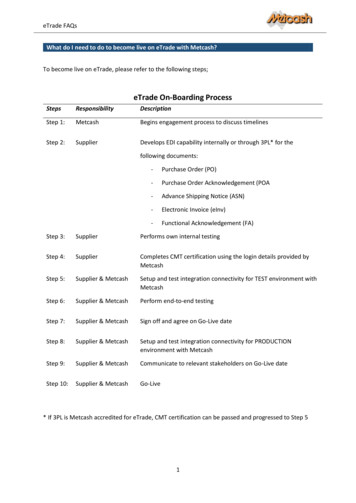
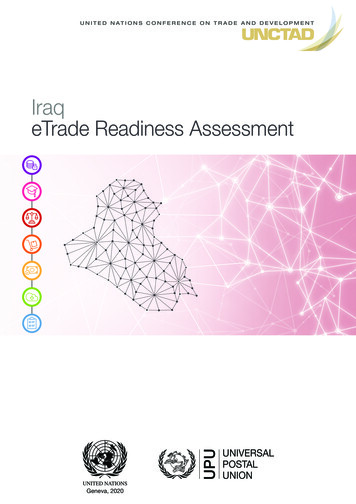
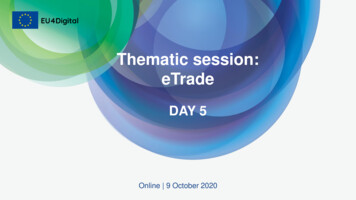

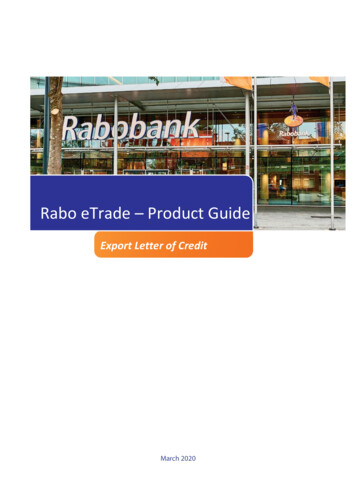
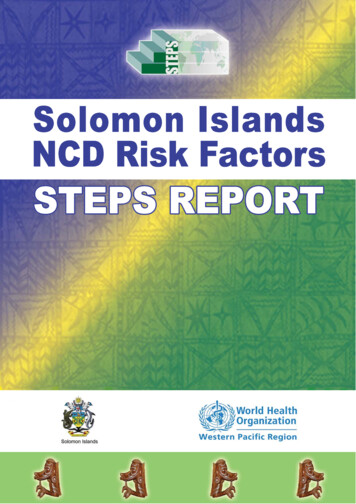
![Kenya: eTrade Readiness Assessment [ADVANCE COPY]](/img/24/dtlecdc2022d2-en.jpg)
